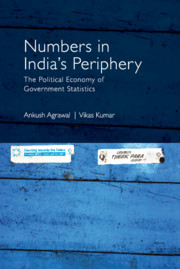7 - Data, Development and Democracy
Published online by Cambridge University Press: 24 April 2020
Summary
[I]n the Reserve Bank [of India] we are handicapped by the reliability of some of the basic data that we need to use in policy calculations.
—Subbarao (2011)There should be no fear of being small in number—as a village, town or District, State or as a people. It is not how many we are that matters, but who we are that really counts. As Nagas we should be known for our courage, integrity and unity, irrespective of our numbers.
—Rio (2014: 37–8)We should judge results, not by statistics or the amount of money spent, but by the quality of human character that is evolved.
—Jawaharlal Nehru's ‘Foreword’ to Elwin (1959)Introduction
In the run-up to the 2011 Census in Nagaland, the government released several advertisements that framed the exercise in moral terms. One of the posters showed a Naga idol exhorting people to give correct responses to census questions with the following words: ‘My future must be built on the truth – Correct Census means strong future!’ (Figure 7.1). Politicians (Rio 2010b: 108; 2011: 73–4), civil society leaders (interviews, 24 November 2012 and 8 April 2013, Dimapur; see also CPO & Ors. vs. UoI & Ors. 2006), bureaucrats (Naga IAS officer, interview, 25 June 2013, Kohima) and church leaders (speeches, Clean Election Campaign, 19 September 2012, Hotel Japfu, Kohima) viewed the manipulation of government statistics as a reflection of individual and collective moral failings and used words such as ‘honesty’, ‘greed’, ‘integrity’ and ‘shame’ to describe the problem. The chief minister argued that the government was helpless in absence of ‘a conscious social decision based on moral values and ethical grounds’ (Rio 2010b: 108). He invoked Naga-Christian values and appealed to all concerned:
to ensure that the Census 2011 [is] conducted properly with truth and honesty. We cannot afford to leave behind for our younger generations a legacy of falsehood and deception. A society cannot be built on the foundation of falsehood and expect to prosper. It goes against our traditional as well as Christian values. We must demonstrate in the right way our traditional qualities of honesty, and uphold the dignity of the Naga people by counting ourselves correctly. (Rio 2011: 73–4)
- Type
- Chapter
- Information
- Numbers in India's PeripheryThe Political Economy of Government Statistics, pp. 285 - 324Publisher: Cambridge University PressPrint publication year: 2020



